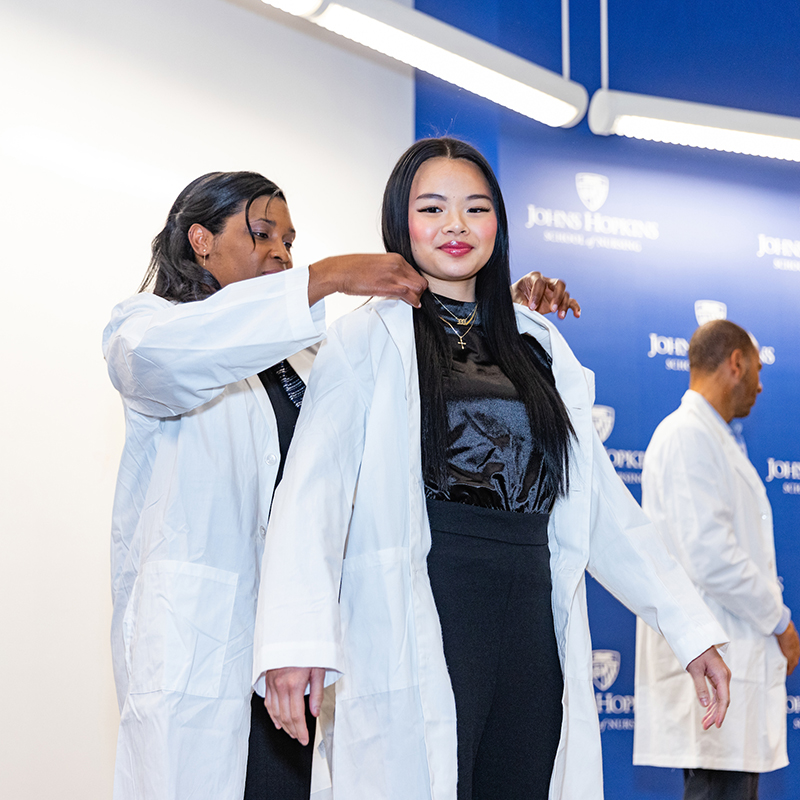Mental Health & Behavioral Interventions
Holistic Approaches on Mental Health
Because a host of factors contribute to mental disorders, a holistic approach is needed to address the biological, psychological, social, and spiritual needs of the person.
Johns Hopkins nurse clinicians, educators, students, and researchers work to address the continuum of mental health, from prevention to intervention, treatment, and recovery supports for individuals, groups, and populations. The goal for all is preventing mental and substance use disorders, removing barriers for those who need treatment, and promoting the health, well-being, and quality of life for all we touch.
Headlines
Featured Content

Associations of dual sensory impairment with long-term depressive and anxiety symptoms in the united states
Prevalence of depressive and anxiety symptoms is common among older adults, and it increases with age. Approximately 26 % of males report depressive and anxiety symptoms, while 27 % and 29 % of females report depressive and anxiety symptoms respectively. Similar studies report 26 % of older adults report anxiety symptoms. A potentially underappreciated risk factor for depressive and anxiety symptoms is dual sensory impairment (DSI), which is typically defined as the co-occurrence of hearing and vision impairments, both of which are highly and increasingly prevalent with advancing age.
Recent Research



Centers and Initiatives
Our faculty-led, interdisciplinary centers and initiatives strengthen a focused area of scholarship in health care by providing an environment to expand the knowledge base, integrate specific education and practice initiatives, and mentor new scholars.
Post-traumatic stress disorder (PTSD) is a formidable opponent. Tamar Rodney believes the key to beating PTSD is acting quickly to identify the syndrome and giving the science time to catch up. Dr. Rodney is a board-certified psychiatric nurse practitioner who has worked in trauma and psychiatry. Her PhD research looked at biomarkers for PTSD in veterans with a traumatic brain injury. […]
Continue readingDeborah Gross is best known for her work designing and scaling behavioral health interventions that support families of young children from low-income, underserved communities and who may have experienced trauma and adversity. At Johns Hopkins, she holds joint appointments in the School of Medicine Department of Psychiatry and Behavioral Sciences and in the Bloomberg School […]
Continue readingCatherine Ling is a nurse scientist, Family Nurse Practitioner (FNP), and certified nurse educator focusing on improving access to quality, primary care. She works to improve culturally competent care for military families and is actively involved in community based practice and interventions to improve wellness at a local and global level. She is also creating […]
Continue readingVideos

Academic Programs
The Johns Hopkins School of Nursing offers programs designed to fit the career and research goals of our diverse student population.
- MSN Healthcare Organizational Leadership
- MSN Healthcare Organizational Leadership/MBA
- DNP Advanced Practice: Adult-Gerontology Acute Care Nurse Practitioner
- DNP Advanced Practice: Adult-Gerontology Primary Care Nurse Practitioner
- DNP Advanced Practice: Pediatric Primary Care Nurse Practitioner
- DNP Advanced Practice: Psychiatric Mental Health Nurse Practitioner
- DNP Executive
- DNP/MPH
- DNP/MBA
- DNP/PhD
- PhD
- Post-Degree Certificates
- Chicago Parent Program Group Leader Training
More Expertise To Explore
Acute & Chronic Care
Addressing equity factors that affect health risks.
Aging
Developing wise, compassionate, and sustainable approaches that stand the test of time.
Community & Global Public Health
Healing at the speed of understanding, across the world.
Gender-based Violence
To identify, educate, and shield those who are most vulnerable.
Infectious Diseases
From COVID-19 to HIV to whatever is next, prepping the tools of prevention.
Mental Health & Behavioral Interventions
Holistic approach addresses biological, psychological, social, and spiritual needs.
Policy, Leadership & Administration
Turning nurses’ hard-won place at the decision-maker’s table into a soapbox on care for all.
Women, Children & Family Health
World health begins wherever home is.